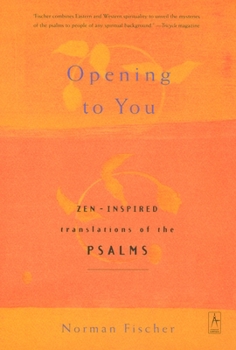Opening to You: Zen-Inspired Translations of the Psalms
"In Norman Fischer's translation, the words of the Psalms are clothed in renewed beauty - clear, uncompromising, shining with devotion."-Jack Kornfield, author of After the Ecstasy, the Laundry A week with the Trappist monks of Gethsemani Abbey in Kentucky left Norman Fischer feeling inspired by the uplifting, soaring verses chanted each day, but also astonished by the violence, passion, and bitterness expressed. This experience started him on a journey through Eastern and Western spirituality and his own Jewish roots toward these moving and intimate translations of the Psalms. In ninety-three poems of praise, celebration, suffering, and lamentation, Opening to You brings the Psalms alive, conveying their beauty and power in accessible English for today's readers of every spiritual path or religious background and transforming the sacred songs into the timeless music of enlightenment.
Format:Paperback
Language:English
ISBN:0142196134
ISBN13:9780142196137
Release Date:February 2003
Publisher:Penguin Publishing Group
Length:208 Pages
Weight:0.47 lbs.
Dimensions:0.5" x 5.3" x 8.1"
Customer Reviews
3 ratings
Thoughtful, beautiful.
Published by Thriftbooks.com User , 17 years ago
Norman Fischer has given great thought and deep contemplation to this Zen-inspired translation of many of the Psalms. This book broadened my understanding of ways in which Zen might encounter a Western God. In such an encounter, both East and West might be enlightened. It is beautiful and I highly recommend it.
Interesting interfaith exercise
Published by Thriftbooks.com User , 23 years ago
There was a period in China when monasteries switched between Nestorian Christianity and Chan (Zen) Buddhism based on which was the most persecuted at the time. It is therefore appropriate, I suspose, to translate the Judeo-Christian prayer book, i.e. the Psalms, into a Zen Buddhist conceptual world.In his search for why the Psalms have retained their value as a prayer book over 3000 years, the Buddhist monk Norman Fischer finds a translation of ideas that works for him. For example, he sees the Psalms' concept of the sovereignty of God as a particular kind of consciousness, related to the mindfulness of Buddhism. In this scheme wickedness is unmindfulness and hence alienation; enemies are internal as much as external.Many of these translations work in that they make one see the Psalm in a new way ... they serve as a catalysis for a new understanding. Their translation is poetic ... the volume is worth reading simply as poetry. However, the volume is not appropriate either in style or in content, to serve as a Psalter for daily prayer.Place this volume in the same category as The Psalms in Haiku - a useful and thought-provoking version of the Psalms to turn to when the Psalter is growing old ... to return to for renewing the freshness of your understanding of the psalms.
The most ancient western devotional poetry made fresh
Published by Thriftbooks.com User , 23 years ago
Fischer has reclaimed the essence of these ancient, passionate songs of suffering and praise. In clear, almost transparent language, he reveals the timeless human longing to *be heard* by a presence that transcends suffering. By stripping away exhausted and loaded language imposed by previous English translations, Fischer shows how language itself can be the tool with which we can forge an intimate relationship with the sacred. As he says in his introduction, "Prayer is not some specialized religious exercise, it is just what comes out of our mouths if we truly pay attention. To pray is to form language, and to form language is to be human." As a Jew who has often turned to poets like Rumi and Rilke for spiritual inspiration, I am delighted to rediscover, thanks to Norman, the treasures within my own heritage.






